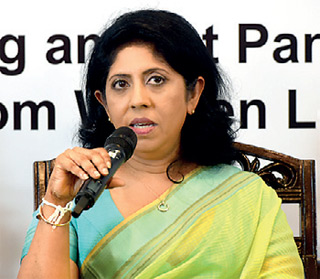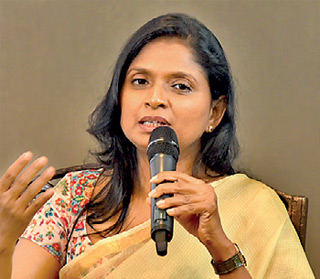Friday Feb 20, 2026
Friday Feb 20, 2026
Monday, 26 July 2021 04:39 - - {{hitsCtrl.values.hits}}
By Charumini de Silva
 |
| Sampath Bank Senior DGM Shashi Kandambi Jassim |
 |
| Hemas Holdings Group CEO Kasturi Wilson |
 |
| Jetwing Travels and Jetwing Hotels Chairperson Shiromal Cooray |
 |
| Prime Group Co-Chairperson Sandamini Perera
|
Making progressive decisions and sticking with those, empowerment of SMEs, policy consistency and refocusing on vibrant sectors to transform challenges into opportunities amidst the pandemic were some of the key wisdoms shared by four top women leaders last week at the Daily FT TV’s inaugural ‘Leaders League’ discussion.
The country’s third largest private bank, Sampath Bank PLC Senior Deputy General Manager Shashi Kandambi Jassim, conglomerate Hemas Holdings PLC Group CEO Kasturi Wilson, Jetwing Travels and Jetwing Hotels Chairperson Shiromal Cooray and Prime Group Co-Chairperson Sandamini Perera shared key insights to Sri Lanka’s way forward amidst the pandemic. The insightful discussion was moderated by Daily FT Editor and Chief Executive Nisthar Cassim.
All four women leaders agreed on policy consistency and implementation for the betterment of the country, without falling prey to the ‘opposing’ culture. This was in response to a question, if offered an opportunity, what would be their sole advice to the President and Cabinet of Ministers.
“Whatever decisions made should be abided by all line ministries, institutions. Private sector and the public must believe in the process. Otherwise, it is not going to work. There is a culture of opposing anything and everything with scepticism. I don’t know if it is the fault of the people or the leadership,” Cooray opined.
Wilson too acknowledged that firm and progressive decisions sometimes are not the most popular, but people must cope up with it for the sake of the entire country rather than opposing every initiative.
Jassim said policy inconsistency has categorised Sri Lanka as one of the most expensive countries to operate a business and insisted on supporting SMEs to drive growth.
Given the economic context, Wilson added that the SMEs are the ones who are grappling with issues.
“It is easy to say invest and grow, but access to capital at the bottom level is tough. As a conglomerate, we are exploring opportunities to support such SMEs with partnerships,” she added.
She pointed out the importance of understanding the consumer priorities and aligning to manufacture relevant products to resolve their problems. Wilson also highlighted the need for policy consistency to plan manufacturing, as it has been a key challenge during the pandemic.
“Everything eventually rolls back to the cost of production,” she said.
Perera said policy makers should focus on thriving sectors to transform challenges into opportunities.
Focusing on the tourism sector, widely seen as most strategic to rebound faster and help Sri Lanka, Cooray said Sri Lanka is left with limited options to overcome the foreign exchange crisis, whilst citing tourism as one of the quickest ways to earn it. However, she noted that the policy makers must take a firm decision whether to open up the country for tourism with controls in place or completely shut out foreign travellers.
Jassim also expressed hope that reopening the country for international tourism soon will ease out the foreign currency situation, with the peak season starting from December to March 2022 as Sri Lanka’s immediate opportunity.
She noted that the economy has been deprived of over $ 12 billion from the tourism sector alone between the 2019 April Easter attacks and the ongoing COVID pandemic. Sri Lanka earned a record $ 4.5 billion prior to the Easter Sunday debacle.
When asked if the banks were willing to support the Rs. 300 billion debt-ridden tourism industry with the write-off of loans, Jassim said they could only consider it, if the Government guarantees funds with support from multilateral funding organisations, as they are liable for each rupee of the public deposits in the banking system.
To develop the pharmaceutical industry, Wilson called on the Government to allow tax breaks to attract global leaders in the sector and facilitate partnerships to anchor around science, knowledge and training.
Despite the challenges, Perera asserted that the low interest rates in the financial sector have impacted the real estate sector favourably with significant demand for mid-rise and affordable category apartments. However, there is no appetite for luxury apartments given the uncertainties, thus causing a surplus in that category.
In response to the impact to the economy and banking sector by way of heavy money printing, Jassim noted that economic superpowers too, have done so and it was inevitable given the pandemic, lower Government income, uncertainty, high costs and absence of borrowings from the international market.
She also insisted that the Government has sufficient tools to manage, adding that the inflationary measures too will be imposed to control the situation.
As a progressive move, Wilson suggested that the Government should consider monetising the assets by recognising the underperforming and listing them in the stock market.
All four women leaders also said that underperformance by a private entity is never an option, despite the pandemic is now part of the ‘new normal’.
The Daily FT later this week will publish the full insights and wisdom from the four women leaders in terms of progressing amidst the pandemic and what is required at institutional, industry and country level, as well as their progressive individual leadership traits.
Pix by Ruwan Walpola